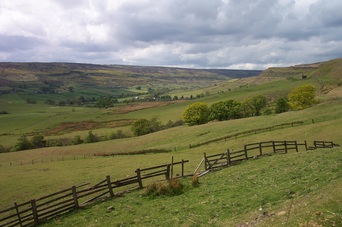 Rosedale, looking up to the dale head on a grey day.
Rosedale, looking up to the dale head on a grey day. In the winter of 2012 I was ready to begin another novel and I wanted to set it in England. I planned a story based on childhood adventures I had with my sister when we turned a discarded tin bath into a boat and sailed in a stream near my grandmother’s house. An idea of sisters finding a foundling baby wormed its way into my mind. I never wrote the story about the sisters and the boat, but the baby stayed with me and became the focus of LIZZIE AND THE LOST BABY.
Children’s writers find inventive ways to remove parents from a story – mine was to make Lizzie and her younger brother Peter World War II evacuees. I was visiting my own parents in England when I began my research and my mother dropped a bombshell: “Your father was an evacuee you know. And your uncle.” No, I didn’t know! And neither did my siblings. But as soon as I found that out, there really was no other way to dispose of Lizzie's parents.
To think of children being sent away to live with strangers for four years at a time of great turmoil and danger seems unimaginable to those of us in secure homes. What a dreadful separation that must have been for children and parents. Lizzie feels that separation keenly and it adds to her feelings of uncertainty and insecurity. Since most people didn’t have cars, petrol was rationed, fathers were in the armed services, and mothers were working, visiting the children was difficult. Lizzie can only maintain her connection with home by writing letters. My father was evacuated with his entire school to a location about 30 miles away from his home and sometimes cycled back to see his parents. 30 miles! Each way! Fourteen when the war broke out, he essentially left home then. My mother wasn't evacuated: my widowed grandmother chose not to send her away and so they both suffered through the horrendous bombing blitz that Hull, their hometown, endured. After London, Kingston Upon Hull was the second-most-bombed city in England. As a child, I remember playing on “bomb sites,” gaps where a house had once stood before it was blown to bits by German bombs.
Since everyone suffered, English people of that generation don’t dwell on the miseries war inflicted on the home front: they don’t talk about how awful it was. “We just had to get on with it,” my Mum once told me. “Everyone did.” If I hadn’t written LIZZIE AND THE LOST BABY, I might never have known this part of my family history. So thank goodness for finding creative ways to get rid of parents in a story.
Lizzie and Peter are evacuated from Hull to Swainedale, a fictional valley in the North York Moors. Swainedale is based on beautiful Rosedale, a valley I have hiked around many times in all weathers and I love every frequently soggy, muddy inch of it. The photograph in the blog header is one view of Rosedale, the photo in this post another and you can see more on my Swainedale page. The cross where Lizzie and Elijah meet in secret is modeled on Ana Cross on Spaunton Moor. I like to think of Lizzie standing up on the moor in the blustery wind watching the sheep and the grouse – so different from the city life she would have known in Hull.
Elijah is the other main character in LIZZIE AND THE LOST BABY. A Gypsy boy, he suffers the prejudice and bigotry of the local people. I'll tell you more about him in my next post.
If you'd like to find out more about evacuees and Hull during WWII, check out the resources listed below.
Resources:
- "When the Children Came Home: Stories of Wartime Evacuees" by Julie Summers, Simon and Schuster, 2012. This book was the first I used to learn about the evacuee experience. Julie Summers is an authority on the home front during WWII and a great writer. Her book "Home Fires: The Story of the Women's Institute in the Second World War" was the inspiration for the recent TV series shown on PBS.
- A You Tube video showing photographs of bomb damage in Hull. It's difficult to understand the extent of the devastation but sources say 95% of the buildings in the city suffered some damage.
- Photos and video clips of evacuees from London. Heartbreaking when you think there were about 3 million evacuees, most of them children.
- BBC archives of people's wartime memories, including evacuation and the blitz.
 RSS Feed
RSS Feed
